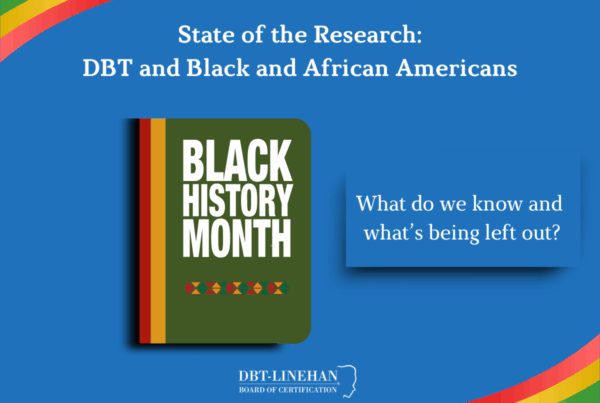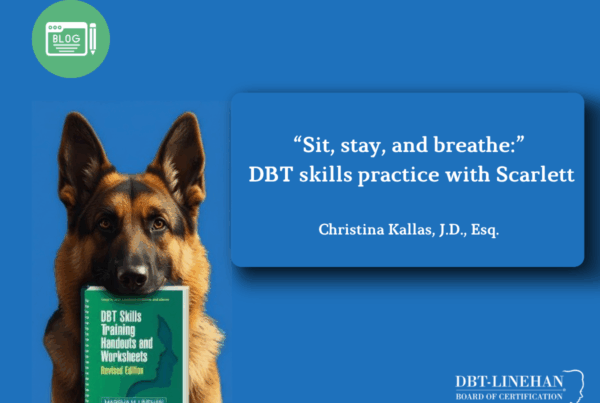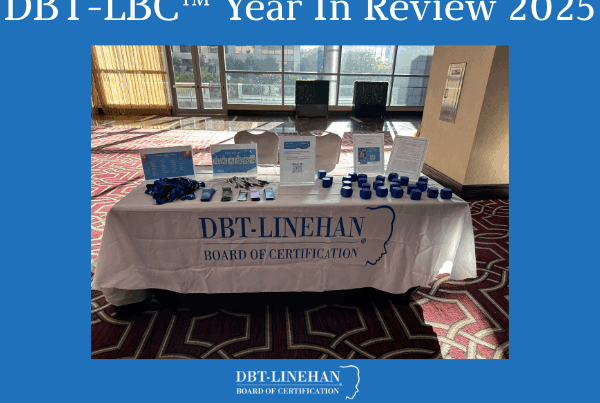Thoughts from our Public Member – Chris Kallas
Sometimes things don’t go as we planned. Often, actually. At those times, it’s good to have resilience. Skills are helpful too.
When I sat in front of Marsha and learned DBT, I thought I was doing it for my child. I never thought I would be using the skills for me, to survive a pandemic. (Really; who would have gone to see that movie? The plot is so – unimaginable.)
Distress Tolerance is not something I would have thought of as a ‘skill’ in those days. Initially the concept of Distress Tolerance was really foreign to me. If life is unfair, why would I tolerate it? Of course, life is often unfair. I’ve wasted a lot of mine complaining about this unfairness, instead of using my energy to do something about it. (It may not be entirely by accident that I became a lawyer.) The idea that I would reduce my suffering by radically accepting reality was something I really had to work at, initially. Well, to be honest, I’m still working at it. But now I know why I need to work at it, and how it will help me to be more effective.
I’ve wasted a lot of my time worrying about my child. Now I realize that I can’t change her. I can’t change what happens to her. Having accepted that reality, I have freed up space in myself to solve MY problems. Ironically, that has made me a more effective mother. I realize that I have a lot of strengths that I developed in parenting her. I learned a lot about human interaction, and that has helped me in all of my endeavors and all of my relationships.
I have been practicing law for 45 years. No client comes to a lawyer without a problem. It may be a hopeful problem, like buying a family home. But often it has to do with something the client perceives to be unpleasant, or distasteful, or infuriating. I wish I had a nickel for every client who has spoken to me about needing a will, and not followed up to write it. I really wish I had a nickel for each one of my friends and colleagues whose child turns 18, and to whom I’ve said, “A wonderful birthday present for your child would be to send her to me and I’ll prepare a health care proxy for her.” I get it. People don’t want to think about their own death (talk about where we need radical acceptance!) They certainly don’t want to talk about the death of a child in his 20s or 30s, who thinks death is for old people. I do get it. And I also sat with parents of young people who died on 9/11, trying to help them figure out how to gain access to the apartment of a grown child, or insurance proceeds, without a death certificate, when they had no body and couldn’t prove death.
Radical Acceptance, and all the Distress Tolerance skills, often come in handy when you are a lawyer.
Learning to really listen, by developing a mindfulness practice, has also made an enormous difference. I’ve had clients say to me, “Writing my will was a lot easier than I thought it would be; you made it so easy.” I’ve had clients call me screaming complaints, and when they stop to take a breath, I’ve asked, “What is it you would like me to do to help you?” Then they stop screaming, because they don’t know the answer to my question! They were just angry – oftentimes for perfectly valid reasons. So I validate them. Then the smart ones start to think, and we can begin to collaboratively problem solve.
Problem solving when you are a lawyer is always collaborative; I can’t make my clients take the action I suggest. The client has the final decision. Sometimes the client chooses an option I think is by no means optimal. No matter; it’s not my call. But again: learning Distress Tolerance Skills has been enormously helpful to me. All of the DBT Skills have been enormously helpful. As I have said to my child, I wish I could take away her illness. (No, I have not radically accepted her diagnosis.) But I am enormously grateful that, as a result of her illness, I have learned – and continue to learn – DBT Skills. And I am by no means the only family member who feels that way. So thanks to all of you who teach us those Skills.





